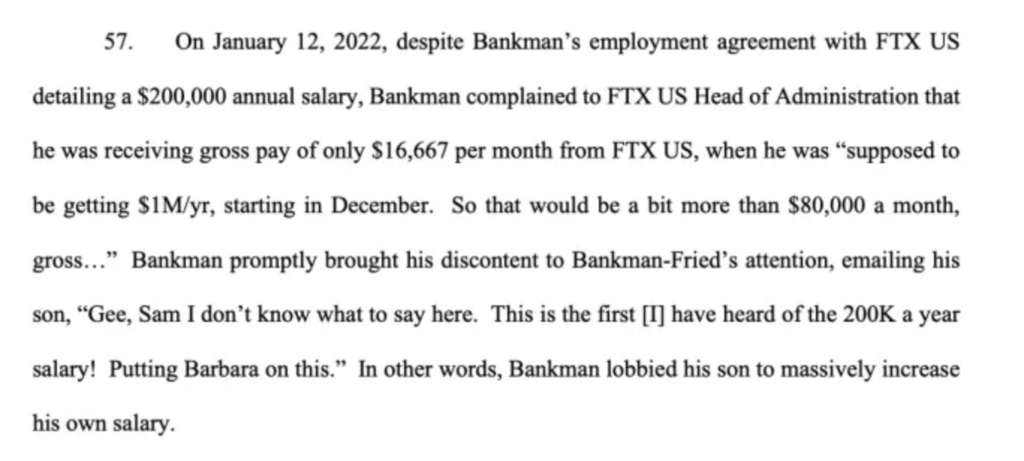The Ponzi Professors

One thing that has emerged from the wreckage of FTX is the extent to which two self-appointed sages of ethics in legal academia were involved in running the company, finding funders, lining up political protection, and skimming the joint dry:
Bankman-Fried needed lawyers. Fortunately, a very, very good one was available. His dad wasn’t an expert in crypto, but at the time Alameda started, no one was. “From the start, whenever I was useful, I’d lend a hand,” Bankman said on an FTX podcast in August 2022. Noting the company didn’t have lawyers at the time, he added, “I think my utility there was pretty obvious.”
Former Alameda staffers say Bankman helped draft early legal documents. Invoices from Fenwick & West, Alameda’s law firm, list him as an attendee in meetings, showing he was involved not only on tax issues but also in the development of marketing materials for FTX and FTT, the made-up currency Bankman-Fried issued when he launched his crypto exchange and the flimsy asset on which a Jenga tower of imagined wealth would sit.
FTX was based in Hong Kong, until the government there began cracking down on crypto in 2021. A person familiar with FTX’s operations says Bankman played a key role in the decision to relocate to the Bahamas, where there were few restrictions on digital currencies. The specifics were arranged by someone Bankman personally recruited—Daniel Friedberg, a former Fenwick & West lawyer who became FTX’s general counsel.
To his employees, Bankman-Fried gave the impression he consulted his dad constantly. When someone would offer a legal suggestion, he’d often say it sounded good but he wanted to “call Joe” first, according to a former staffer, who added that almost all the lawyers who worked for Alameda seemed to be friendly with Bankman.
Other ex-employees say that, especially compared with Bankman-Fried—who sometimes struggled to make eye contact and could be blunt, bordering on cruel, when dealing with employees—the father had a way with people. Training as a psychotherapist had made him an excellent listener, and he was an energetic conversationalist. He asked employees about their personal lives, joined in for games of padel (a pickleball-like sport that employees were crazy about) and showed up at company dinners. Fried also attended FTX dinners but appeared less frequently in the office. They both served as mediators between staff and their child. If Bankman-Fried said something mean or indecipherable, his dad would try to translate or simply say he understood his son could be difficult. He was seen, another employee recalls, as a “cute old man,” a capable but nonthreatening figure who was there to keep his son from losing control.
But the most important role Bankman and Fried played was to give their son credibility with people who might not otherwise be inclined to do business with a sketchy upstart. In 2021, when Bankman-Fried approached Sequoia Capital about making a big investment, the firm was interested in backing a global crypto exchange but had concerns about potential legal and regulatory risks, according to two people familiar with the deal.
[…]
FTX was in the same basic business as Binance and BitMEX, but Bankman-Fried was adamant that his long-term goal was to secure the approval of US regulators. Plus, he had something those companies didn’t: an endorsement from a former commissioner of the US Securities and Exchange Commission. Sequoia was convinced to invest, say people close to the deal, after a phone call from a prominent ex-SEC official who’d consulted with the firm informally on previous deals and now teaches at Stanford. This former official spoke in support of FTX’s legal strategy—which involved operating overseas while it worked to win approval from US regulators—and said Bankman-Fried also happened to be the son of his friends.
The endorsement was part of a pattern. “Both parents really opened doors for Sam,” says a person who was involved in Bankman-Fried’s effort to get American politicians to embrace his firm.
One theme of the story is how arbitrary the judgments of Silicon Valley venture capitalists and other financiers are, how much they’re based on superficial judgments. Having respected Stanford Law professor(s) on SBF’s side helped enormously in funding his Ponzi scheme.
And I do mean superficial:
In magazine profiles and TV interviews, Bankman-Fried professed austerity. He wore beat-up sneakers, lived with roommates and drove a Toyota Corolla—with all of the savings going to charitable causes, he said. “You pretty quickly run out of really effective ways to make yourself happier by spending money,” he told a Bloomberg reporter in early 2022. “I don’t want a yacht.”
In reality, Bankman-Fried and his inner circle spent with such abandon that the office could feel, as the person who worked on the Super Bowl ad describes it, like the Emerald City in The Wizard of Oz. The company bought hundreds of millions of dollars of luxury real estate, including a $30 million penthouse apartment in the fanciest resort in the Bahamas, where Bankman-Fried and his cohorts lived. They chartered private jets for themselves and, because Amazon.com doesn’t consistently service the island, for their online packages. And—as bankruptcy filings would make clear—they even bought a 52-foot yacht. It was purchased by Alameda for Sam Trabucco, the company’s co-CEO at the time, who named it Soak My Deck.
The number of stories that printed the “I have roommates!” story when polishing Bankman-Fried’s apple without noting that the “roomates” lived in massive Bahamian mansion and were in some cases romantically involved with one another to sell his “effective altruism” story is something. And his parents were amply rewarded for their support, lobbying, and legal advice from the company coffers:
Bankman-Fried’s parents seemed to share in the spoils. They flew first class, sometimes private. After landing in the Bahamas, they regularly stayed in a $16 million beachside apartment. FTX bought that dwelling, along with three dozen others on the island, at a cost of roughly $250 million. Through their spokeswoman, Bankman and Fried have said they saw the home as company property, not theirs.
Bankman-Fried expressed a similar sentiment in an interview at a New York Times conference. “I know it was not intended to be their long-term property,” he said. “I don’t know how that was papered in.”
So here’s how it was papered in: A bill of sale, obtained through a public records request in the Bahamas, shows that on April 7, 2022, Bankman and Fried signed as co-owners of the apartment, with a Bahamian notary as witness. The document makes no mention of FTX and refers to the property as a “vacation home.” “The house was used as temporary housing while Joe worked in the Bahamas,” the spokesperson for the couple said in a statement. “Outside counsel confirmed to Joe and Barbara that FTX would have all beneficial ownership of the house and agreed to document that in writing.”
Around the same time, Bankman received a $10 million gift from his son. A lawsuit filed by Ray, the FTX bankruptcy chief, claims Bankman-Fried got the money by borrowing it from an account that contained customer funds. According to the complaint, he did so after consulting the person who by this point had become a top adviser on legal matters personal and professional: his dad. The lawsuit alleges that the loan was never formalized—there’s no loan agreement, promissory note “or other indication that the funds were not simply taken from Alameda by Bankman-Fried to enrich his family.” His father moved almost $7 million to personal bank accounts; the rest he kept in crypto on FTX.
SBF’s legal defense is being funded in substantial measure by the $10 million he allowed his parents to loot from the company. You gotta know that a guy who helps you steal even if you take care of him real well he’s gonna steal a little extra for himself!
There’s more juicy details from the lawsuit the remnants of FTX filed against Bankman and Fried here. I especially treasure Bankman — who has lived in a household reeling in two Stanford Law salaries for decades alongside God knows how many of the side hustles available to people in their position — complaining that his beak was not getting nearly wet enough and telling Sam he might have to go to his mommy about it:

And, as always, the more people get compensated, the less they think that this compensation should be used to pay for their living expenses:

I don’t know about altruism, but it sure was effective!


